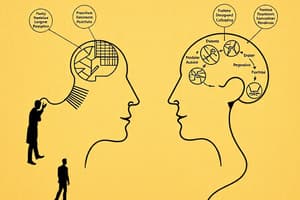Podcast
Questions and Answers
What does the biological domain of psychology primarily focus on?
What does the biological domain of psychology primarily focus on?
- The impact of culture on behavior
- The influence of genetics and neuroscience on behavior (correct)
- The adaptation of behavior to environmental changes
- The structure of the mind through introspection
Which psychological approach emphasizes personal growth and the concept of innate goodness?
Which psychological approach emphasizes personal growth and the concept of innate goodness?
- Psychoanalytic Theory
- Cognitive Psychology
- Behaviorism
- Humanism (correct)
Who is primarily associated with the development of Functionalism in psychology?
Who is primarily associated with the development of Functionalism in psychology?
- William James (correct)
- Abraham Maslow
- Wilhelm Wundt
- Sigmund Freud
What key focus area distinguishes Gestalt Psychology from other psychological approaches?
What key focus area distinguishes Gestalt Psychology from other psychological approaches?
Which psychological field is primarily concerned with psychological disorders and their treatment?
Which psychological field is primarily concerned with psychological disorders and their treatment?
The Five-Factor Model is commonly associated with which domain of psychology?
The Five-Factor Model is commonly associated with which domain of psychology?
Feminist Psychology primarily addresses which issue within the field?
Feminist Psychology primarily addresses which issue within the field?
What is a primary concern of cross-cultural psychology?
What is a primary concern of cross-cultural psychology?
Which problem-solving strategy guarantees results through a step-by-step approach?
Which problem-solving strategy guarantees results through a step-by-step approach?
In decision-making, which bias involves relying heavily on initial information?
In decision-making, which bias involves relying heavily on initial information?
What does the Triarchic Theory of Intelligence propose as its three components?
What does the Triarchic Theory of Intelligence propose as its three components?
Which of the following statements reflects the concept of functional fixedness?
Which of the following statements reflects the concept of functional fixedness?
What aspect of intelligence does the CHC Theory emphasize?
What aspect of intelligence does the CHC Theory emphasize?
Which learning disability is characterized by difficulties with reading due to letter and word processing?
Which learning disability is characterized by difficulties with reading due to letter and word processing?
What underlies the idea of the nature vs. nurture debate in intelligence?
What underlies the idea of the nature vs. nurture debate in intelligence?
What term describes the cognitive milestone where children understand that objects continue to exist even when out of sight?
What term describes the cognitive milestone where children understand that objects continue to exist even when out of sight?
Which theory of intelligence suggests multiple types of intelligence such as linguistic and spatial?
Which theory of intelligence suggests multiple types of intelligence such as linguistic and spatial?
Which of the following best describes successful aging?
Which of the following best describes successful aging?
What is the primary purpose of the scientific method in psychology?
What is the primary purpose of the scientific method in psychology?
Which type of research design focuses on describing observed behaviors without testing relationships?
Which type of research design focuses on describing observed behaviors without testing relationships?
What does statistical significance indicate in psychological research?
What does statistical significance indicate in psychological research?
In classical conditioning, what is the term for the process of weakening a conditioned response?
In classical conditioning, what is the term for the process of weakening a conditioned response?
Which of the following is an example of positive punishment?
Which of the following is an example of positive punishment?
What is an operational definition in research?
What is an operational definition in research?
What aspect of behavior does Bandura's Social Learning Theory primarily emphasize?
What aspect of behavior does Bandura's Social Learning Theory primarily emphasize?
What distinguishes a theory from a hypothesis in psychological research?
What distinguishes a theory from a hypothesis in psychological research?
Which statement about operant conditioning is accurate?
Which statement about operant conditioning is accurate?
What is the role of Institutional Review Boards (IRBs) in psychological research?
What is the role of Institutional Review Boards (IRBs) in psychological research?
What is an example of latent learning?
What is an example of latent learning?
What is a key feature of double-blind studies?
What is a key feature of double-blind studies?
Which of the following statements about learning is true?
Which of the following statements about learning is true?
Flashcards
What is Psychology?
What is Psychology?
The scientific study of mind and behavior, investigating both observable actions and internal thoughts and emotions.
What is Structuralism?
What is Structuralism?
Focused on the basic elements of consciousness through introspection, like breaking down a thought into its individual parts.
What is Functionalism?
What is Functionalism?
Emphasized the purpose of behavior and how it helps us adapt to the environment, like a continuous flow of mental activity.
What is Psychoanalytic Theory?
What is Psychoanalytic Theory?
Signup and view all the flashcards
What is Humanism?
What is Humanism?
Signup and view all the flashcards
What is Cognitive Psychology?
What is Cognitive Psychology?
Signup and view all the flashcards
Why is Multicultural Psychology important?
Why is Multicultural Psychology important?
Signup and view all the flashcards
What is the Biological Domain of Psychology?
What is the Biological Domain of Psychology?
Signup and view all the flashcards
Trial and Error
Trial and Error
Signup and view all the flashcards
Algorithm
Algorithm
Signup and view all the flashcards
Heuristic
Heuristic
Signup and view all the flashcards
Mental Set
Mental Set
Signup and view all the flashcards
Functional Fixedness
Functional Fixedness
Signup and view all the flashcards
Anchoring Bias
Anchoring Bias
Signup and view all the flashcards
Hindsight Bias
Hindsight Bias
Signup and view all the flashcards
Representativeness Bias
Representativeness Bias
Signup and view all the flashcards
Confirmation bias
Confirmation bias
Signup and view all the flashcards
Availability Bias
Availability Bias
Signup and view all the flashcards
Why is research important in Psychology?
Why is research important in Psychology?
Signup and view all the flashcards
What is a theory in Psychology?
What is a theory in Psychology?
Signup and view all the flashcards
What is a hypothesis in Psychology?
What is a hypothesis in Psychology?
Signup and view all the flashcards
What is Descriptive Research?
What is Descriptive Research?
Signup and view all the flashcards
What is a Case Study?
What is a Case Study?
Signup and view all the flashcards
What is Naturalistic Observation?
What is Naturalistic Observation?
Signup and view all the flashcards
What is a Survey Research?
What is a Survey Research?
Signup and view all the flashcards
What is Correlational Research?
What is Correlational Research?
Signup and view all the flashcards
What is Experimental Research?
What is Experimental Research?
Signup and view all the flashcards
What is a variable in Research?
What is a variable in Research?
Signup and view all the flashcards
What is an Operational Definition?
What is an Operational Definition?
Signup and view all the flashcards
What are Control and Experimental Groups?
What are Control and Experimental Groups?
Signup and view all the flashcards
What is a Double-Blind Study?
What is a Double-Blind Study?
Signup and view all the flashcards
What is Reliability in Research?
What is Reliability in Research?
Signup and view all the flashcards
What is Validity in Research?
What is Validity in Research?
Signup and view all the flashcards
Study Notes
Chapter 1: Introduction to Psychology
- Psychology is the scientific study of mind and behavior, encompassing both observable actions and internal thoughts/emotions.
- Structuralism focused on the structure of the mind, using introspection.
- Functionalism emphasized adaptation to the environment, seeing consciousness as a continuous flow.
- Psychoanalytic theory (Freud) focused on the unconscious mind, early childhood, and methods like dream analysis.
- Gestalt psychology viewed perception as a whole, not just individual parts.
- Behaviorism focused on observable behaviors, conditioning, and reinforcement (Pavlov, Watson, Skinner).
- Humanism emphasized personal growth, innate goodness (Maslow, Rogers).
- Cognitive psychology studied mental processes like memory, perception, and language.
- Feminist psychology addressed gender bias in studies.
- Multicultural/Cross-cultural psychology recognized biases toward Western populations, promoting diversity.
- Contemporary domains include biological (neuroscience, genetics), cognitive (memory, language), developmental (lifespan), social/personality (interactions, individual differences), and mental/physical health (disorders, clinical treatment, health impacts).
- Other subfields include industrial-organizational, forensic, and sport/exercise psychology.
- Psychology in Turkey includes historical milestones like the first course in 1915, and the development of departments & the Turkish Psychological Association.
- Studying psychology enhances critical thinking, understanding complex behaviors, and career opportunities.
Chapter 2: Research Methods in Psychology
- Psychology relies on scientific methods to challenge beliefs and pseudosciences (unlike phrenology).
- Critical thinking evaluates ideas based on evidence.
- Theories explain observations, while hypotheses are testable predictions about variables.
- Descriptive research observes behaviors without testing relationships (case, naturalistic, or survey studies).
- Correlational research examines relationships between variables (correlation ≠ causation).
- Experimental research tests cause-effect relationships, manipulating variables.
- Variables are factors, operational definitions specify how variables are measured, and control/experimental groups isolate variable effects.
- Double-blind studies help prevent researcher and participant bias.
- Reliable studies yield consistent results, valid studies measure what they intend to.
- Statistical significance (p-value) suggests unlikely chance results.
- Institutional Review Boards (IRBs) protect participant welfare.
- Informed consent ensures participant understanding.
- Deception and debriefing processes are crucial for ethical research.
- A research article (APA style) includes an abstract, introduction, methods, results, and discussion.
Chapter 3: Learning
- Learning involves a change in behavior or knowledge from experience.
- Instincts are complex unlearned behaviors, while reflexes are automatic responses.
- Associative learning involves forming connections between stimuli (classical and operant).
- Classical conditioning associates two stimuli (Pavlov's dogs). Processes include acquisition, extinction, spontaneous recovery, generalization, and discrimination.
- Operant conditioning links behaviors with consequences (Law of Effect). Reinforcement increases behavior (positive/negative). Punishment decreases it (positive/negative). Shaping trains behaviors by reinforcing successive approximations.
- Observational learning involves watching and imitating others; Bandura's Social Learning Theory emphasizes this process.
- Real-world applications of learning principles include medical settings, advertising, parenting, and behavior modification.
- Punishment can be problematic if not managed effectively because of fear/aggression issues, and lack of positive reinforcement; latent learning is initial unobservable learning.
Chapter 6: Thinking and Cognition
- Thinking encompasses perception, learning, problem-solving, judgment, and memory.
- Concepts are categories to organize information (prototypes, natural, or artificial).
- Schemas are mental structures organizing related concepts (role and event schemas).
- Language is a communication system shaping and reflecting culture.
- Language shapes thought (language and thought debate).
- Problem-solving strategies include trial and error, algorithms, and heuristics.
- Problem-solving pitfalls include mental sets and functional fixedness.
- Decision-making biases include anchoring, hindsight, representativeness, confirmation, and availability.
- Theories of intelligence include Triarchic (analytical, creative, and practical), Multiple Intelligences (various types), Emotional Intelligence (interpersonal), and Hierarchical CHC.
- Creativity involves generating novel ideas, through divergent (exploring) and convergent thinking (narrowing).
- Intelligence is measured by IQ scores (standardized and normed, using tests like Wechsler Scales).
- IQ scores generally follow a normal distribution (bell curve).
- Intelligence involves interplay of nature (genetics) and nurture (environment).
- Learning disabilities include dysgraphia, dyslexia.
Chapter 7: Developmental Psychology
- Developmental theories include Freud's psychosexual, Erikson's psychosocial, and Piaget's cognitive. Stages of prenatal, infancy, childhood, adolescence, and adulthood.
- Prenatal development encompasses germinal, embryonic, and fetal stages.
- Infancy includes reflexes and developing motor skills.
- Childhood involves cognitive milestones (object permanence, conservation) and psychosocial development.
- Adolescence involves puberty, abstract thinking, risk-taking, and identity formation.
- Adulthood involves physical, cognitive, and psychosocial changes (young, middle, late).
- Developmental issues include nature vs. nurture, continuity vs. discontinuity, and universal vs. individual pathways.
- Successful aging involves healthful habits, mental engagement, social connection, and adaptability.
Studying That Suits You
Use AI to generate personalized quizzes and flashcards to suit your learning preferences.



